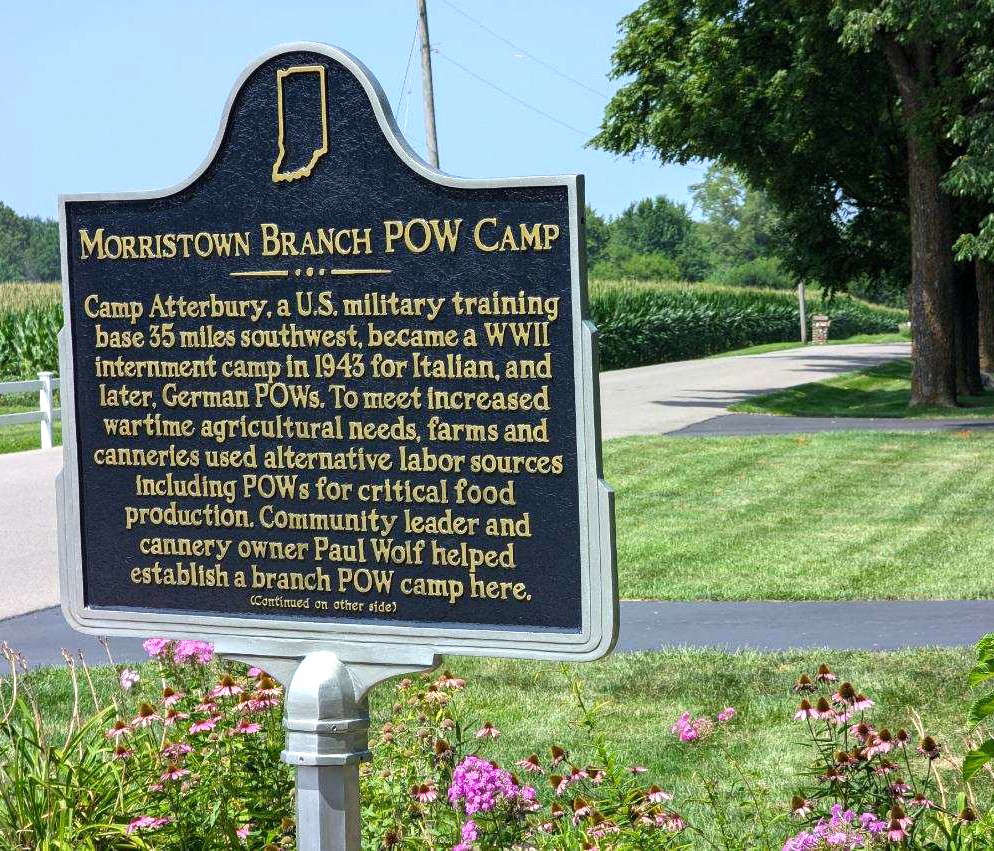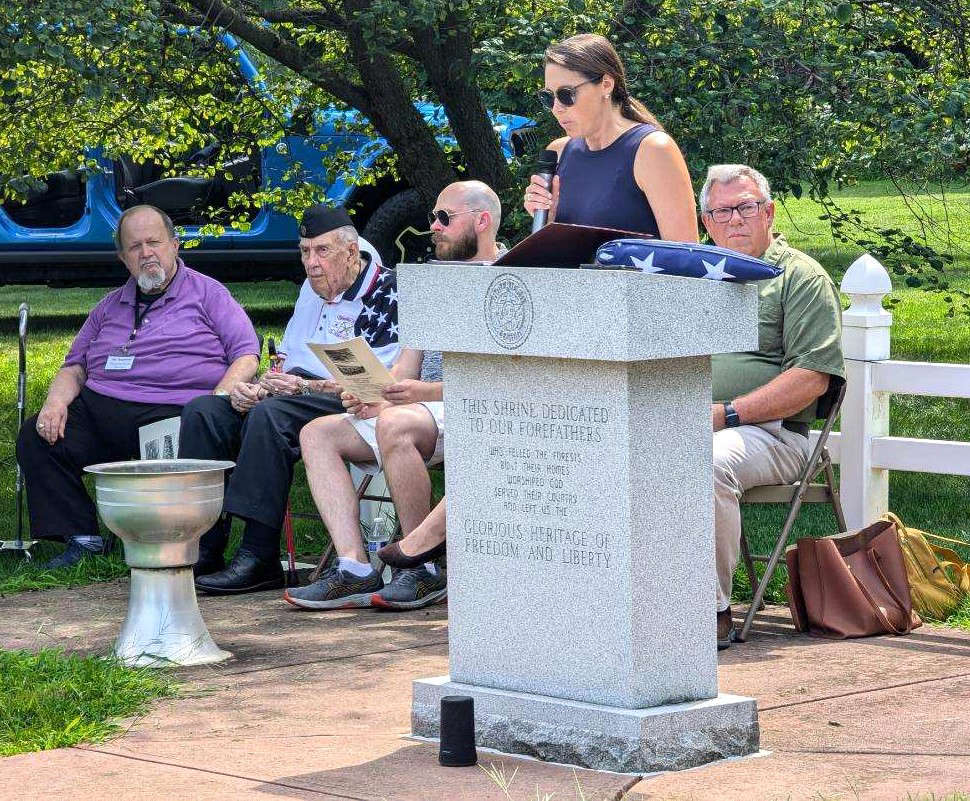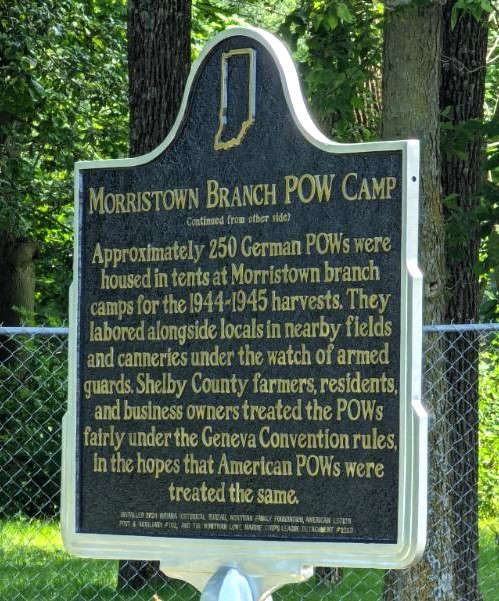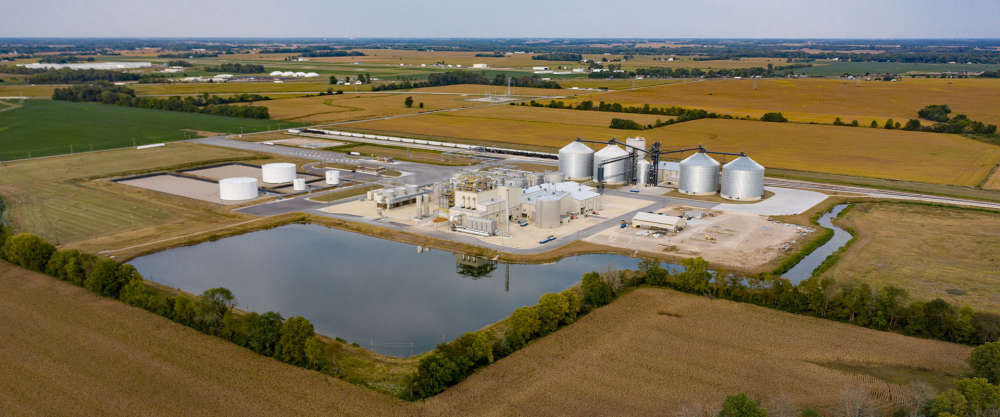
MORRISTOWN -- In a time when the physical landscape no longer reflects past history, a state historical marker reminds of the impact the Morristown Branch Prisoner of War Camp had on the community.
On Saturday near the Asbury Cemetery north of Morristown, the Morristown Branch POW Camp was officially dedicated.
During World War II, Camp Atterbury served as an internment camp for Italian, and later, German POWs. To improve wartime agricultural production, local farms and canneries utilized alternative labor sources such as women and children and eventually POWs.
Morristown community leader and cannery owner Paul Wolf helped establish a branch POW camp in the community.

“Morristown Canning Company and Blue River Packing Company were important industries in Indiana in the 1930s and 1940s, as they provided employment opportunities for local citizens and processing facilities for farmers,” said Dr. Michella Marino of the Indiana Historical Bureau at Saturday’s dedication ceremony (photo). “These local industries served a critical role in global food production during World War II in terms of helping feed soldiers abroad and civilians at home, particularly as Americans grappled with war-time rationing.”
Nearly a dozen local canneries in Shelby County struggled to keep up with demand in the mid-1940s, according to Dr. Marino. Women and children were recruited into the work force along with migrant seasonal workers. As children returned to school in the fall, though, the canneries were desperate for more workers.
Wolf, who served in the Army during World War I, had several careers before owning canneries. He along with other local and statewide canning, agriculture and labor officials met with Army representatives to discuss the dire labor shortage in Shelby County.
At first, Italian POWs were used on farms and in canneries in the five counties surrounding Camp Atterbury, located 35 miles southwest of Morristown. The POWs were driven to and from their work sites daily.
Once Italy joined the Allied Powers and declared war on Germany, the Italian POWs were transferred out of Camp Atterbury in the spring of 1944. They were replaced with German POWs recently captured in North Africa.
To save on gas, time and money, Camp Atterbury branch POW camps were established at four sites around the state, including Morristown.

“These areas in particular needed extra seasonal labor for the harvest and in nearby canneries and packing companies,” said Dr. Marino. … “Approximately 200 to 250 POWs were held at the Morristown branch camp per season and worked in the nearby fields for local farmers and in the canneries and packing companies in Shelby, Hancock, Rush, Henry and Marion counties.”
The POW camp had sanitation facilities and regular Army field kitchens. The prisoners were kept under guard but were not considered “risks” or “threats.”
The POWs were considered to be treated well and were open about their preference for work over war, according to Dr. Marino.
“The community of Morristown not only relied on but appreciated the labor provided by the POWs,” said Dr. Marino. “Some of the German POWs formed relationships with cannery employees and family members that lasted beyond their times at the camps.”
The state historical marker is located at the corner of E 1100 North and Asbury Road in Morristown.
The Shelby County Post is a digital newspaper producing news, sports, obituaries and more without a pay wall or subscription needed.


 Site development plans approved for Speedway, Circle K
Site development plans approved for Speedway, Circle K
 ISP shopping safety tips
ISP shopping safety tips
 Silver Alert declared for missing Indianapolis teen
Silver Alert declared for missing Indianapolis teen
 Hope and Rushville awarded OCRA grants
Hope and Rushville awarded OCRA grants
 School board approves curriculum additions at Shelbyville High School
School board approves curriculum additions at Shelbyville High School
 Shelbyville senior receives 2026 Lilly Endowment Community Scholarship
Shelbyville senior receives 2026 Lilly Endowment Community Scholarship
 Common Council approves tax abatement plan for potential POET Bioprocessing facility expansion
Common Council approves tax abatement plan for potential POET Bioprocessing facility expansion
 Father arrested after child outdoors in diaper, drugs found in Greenfield apartment
Father arrested after child outdoors in diaper, drugs found in Greenfield apartment




